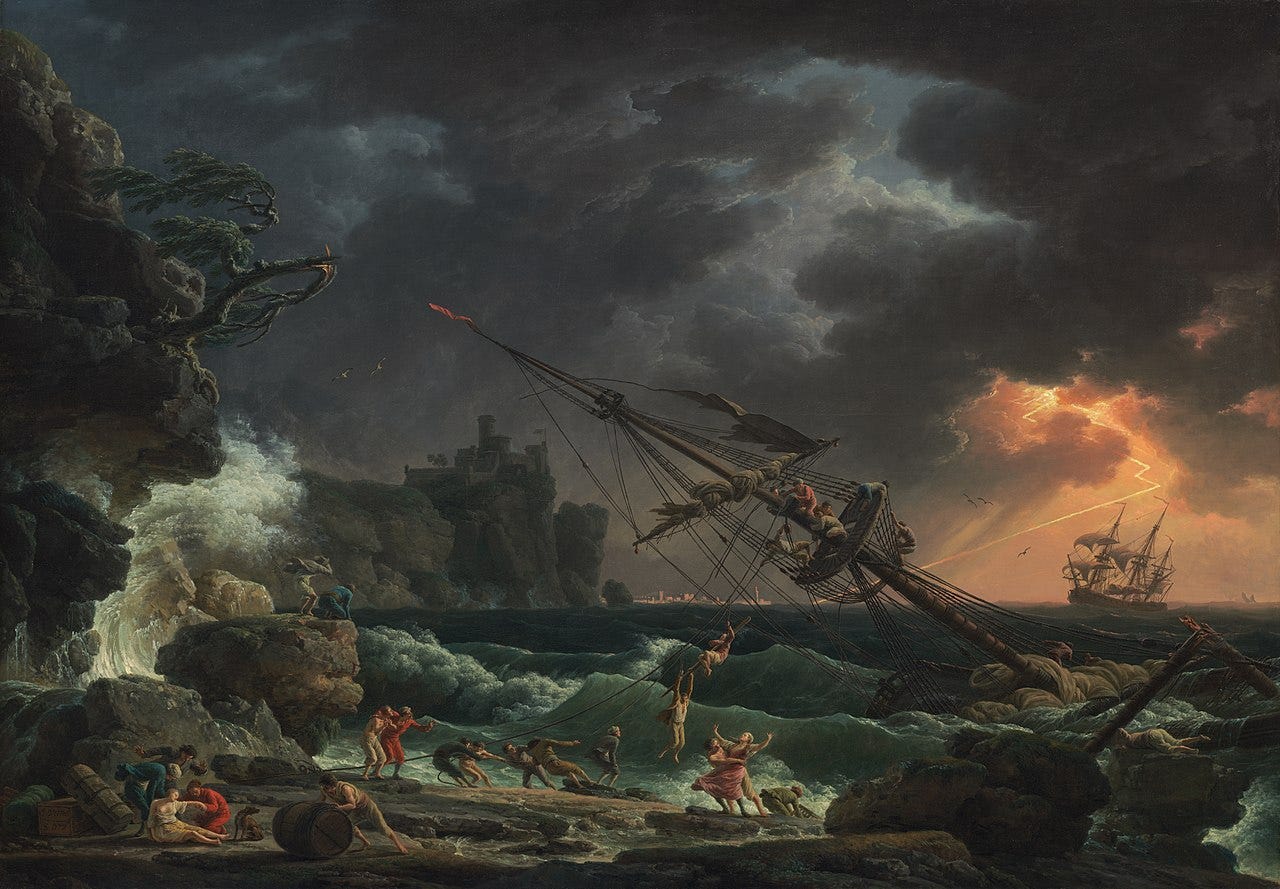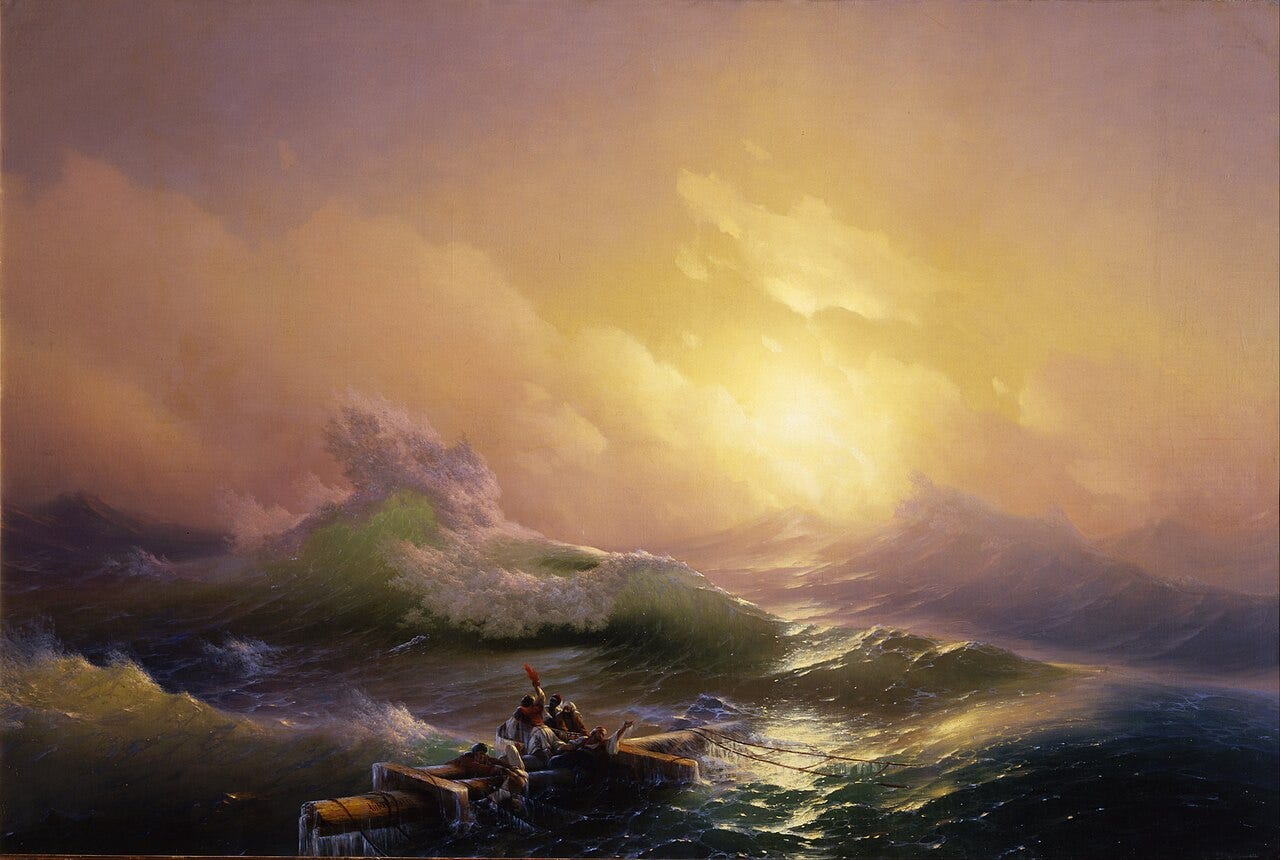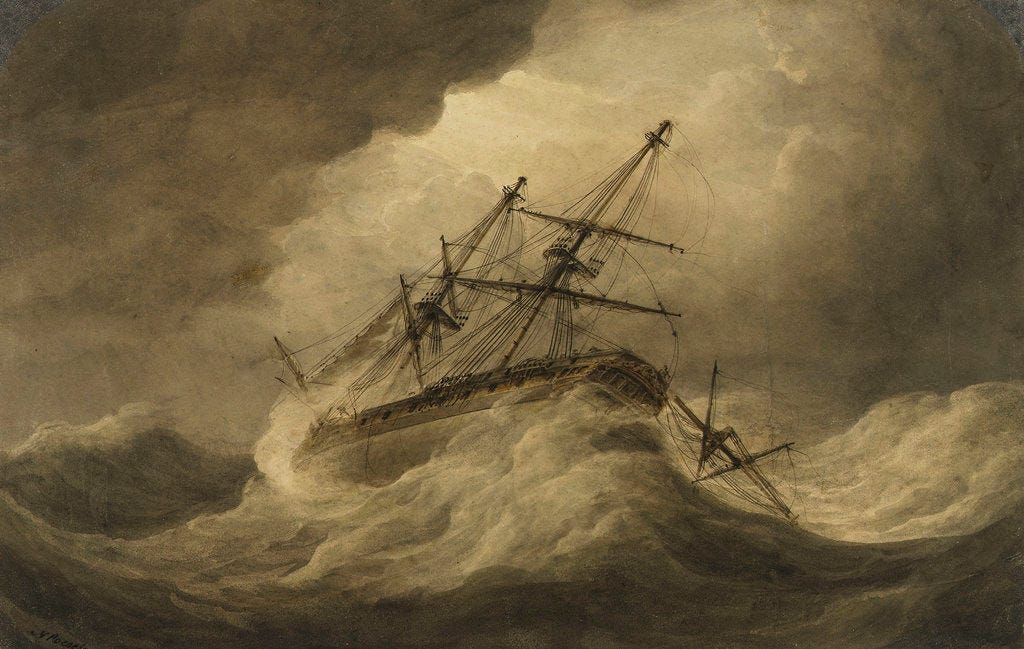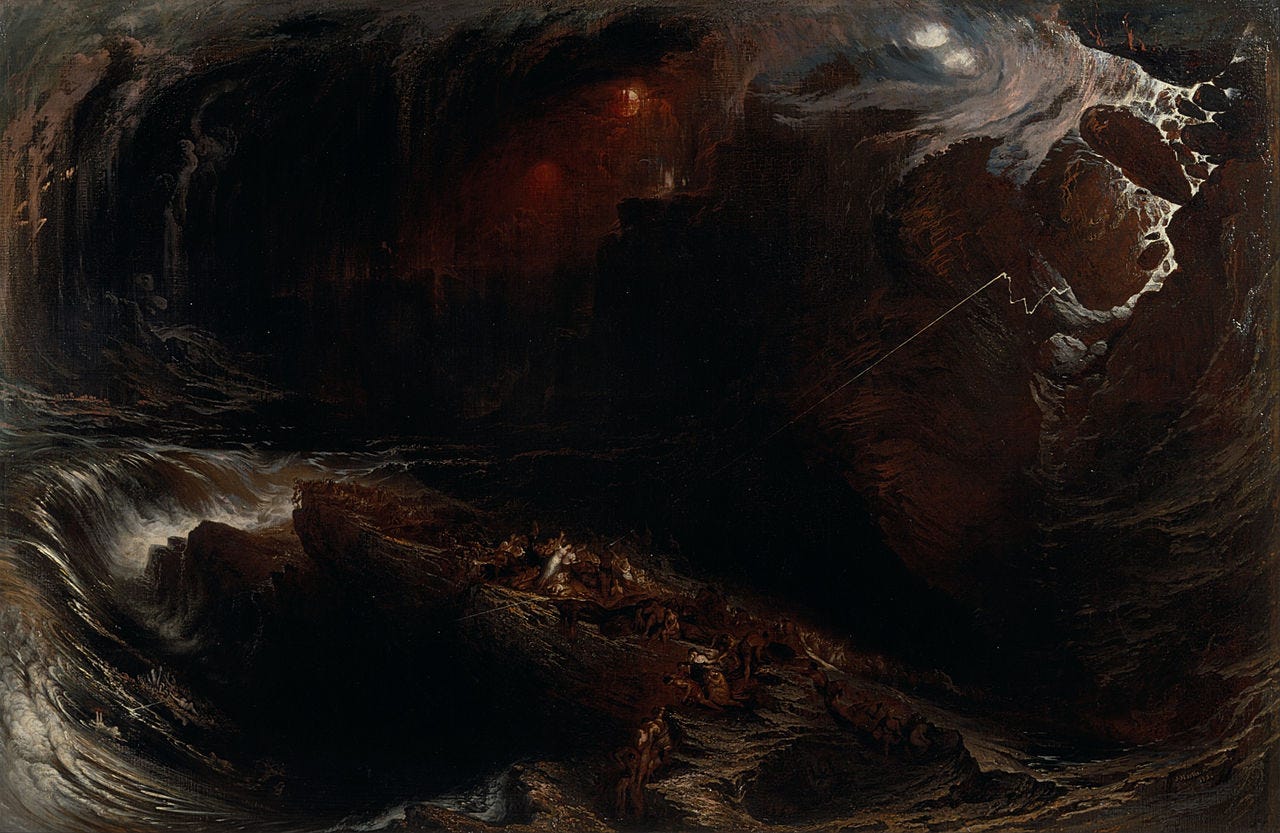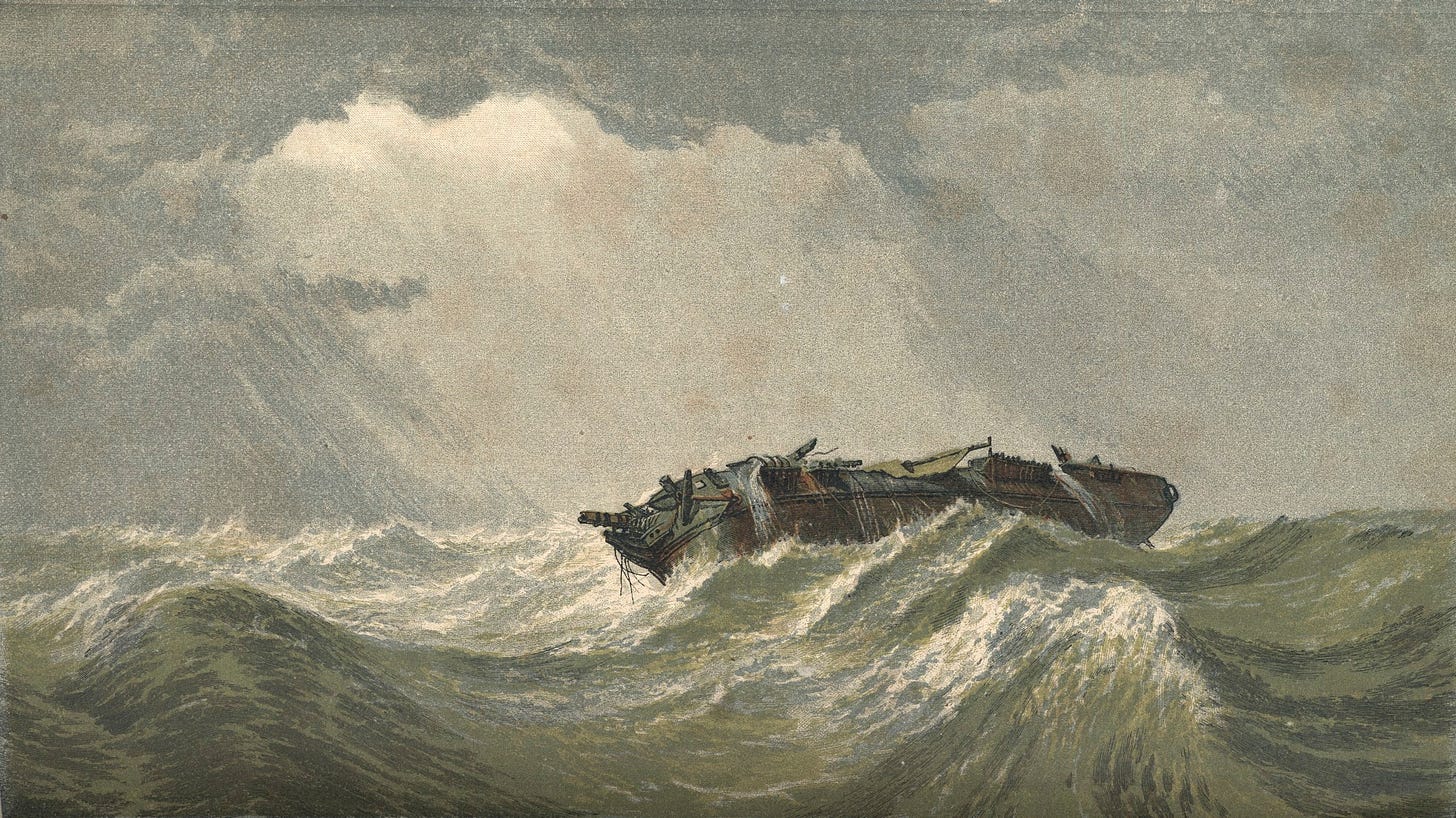The Storm
Gaia’s Notebook: Edition I
Welcome to Cosmographia. The following is part of our Gaia’s Notebook series, where we take a look at Mother Earth in all her glory. For the full map of Cosmographia posts, see here.
The Sea. Source of both fear and fascination, terror and the sublime.
Her temperamental currents and fickle unpredictability remain a stark reminder of nature’s power. And yet, nothing is more emblematic of human courage, or our sense of adventure, than a ship charting course for the wide expanse of open ocean. For as long as we’ve had the means, humanity has explored the seas, despite all its dangers.
The sea has long served as our primary means of travel, trade, and discovery, bridging continents, cultures, and peoples. She’s been a source of food, energy, and artistic inspiration. But, at the same time, she’s also been the means by which we’ve committed many of the worst of our crimes: war, piracy, slavery.
The duality of our obsession, at the heart of our relationship with the sea, must surely be rooted in its hold over life itself. At her best, the sea is a nurturing mother. At her worst, she’s a vengeful cataclysm.
The ancients understood the two faces of the sea when they personified her in gods like Neptune, Calypso, Varuna, or Mazu, whose capricious moods might guarantee a sailor safe passage, or a watery doom.
Gods aside, art is the other great means by which we’ve attempted to understand nature and all her complexities. Through literature, paint, and prose, have artists strived to capture and comprehend that fateful force we call the Sea. Here, we will look at just one of her two faces. Twenty-four paintings and twenty-four literature excerpts.
Behold: The Storm.
“The sea roars, the wind whistles, the thunder cracks, the pale, sombre glow of lightening pierces through the clouds, momentarily revealing the scene. One hears the noise of a ship's hull being breached, its masts tipped over, its sails ripped. The crew is terrified; some on the bridge lift their arms towards the heavens, others throw themselves into the water, the waves smash them against the neighbouring rocks where their blood intermingles with the whitening foam; I see some of them floating, I see others about to be swallowed up, I see still others straining to reach the shore against which they'll be dashed to pieces.”
— Denis Diderot, in a review of the above painting (c. 19th century)
"The sun drops luridly into the west; darkness has raised her arms to draw him down before the time, not waiting as of wont till he has come to her behind the sea; and the smooth waves grow sullen in the gloom and wear their threatening purple; more and more the plain of waters sways and seems to rise convexly from its level of the shores; and low dull thunder rolls along the beach: there will be storm at last, storm, glorious storm."— Augusta Davies Webster, opening lines of Circe (19th century)
"Again she plunges! Hark! A second shock Tears her strong bottom on the marble rock! Down on the vale of death, with dismal cries, The fated victims shuddering roll their eyes, In wild despair; while yet another stroke, With deep convulsion, rends the solid oak."— William Falconer, excerpt from the third canto of The Shipwreck (1762)
"I must go down to the seas again, to the lonely sea and the sky, And all I ask is a tall ship and a star to steer her by; And the wheel’s kick and the wind’s song and the white sail’s shaking, And a grey mist on the sea’s face, and a grey dawn breaking."— John Masefield, Saltwater Ballads (1902)
“And, behold, I, even I, do bring a flood of waters upon the earth, to destroy all flesh, wherein [is] the breath of life, from under heaven; [and] every thing that [is] in the earth shall die.”
— Genesis 6:17
“As for me, I am tormented with an everlasting itch for things remote. I love to sail forbidden seas, and land on barbarous coasts.”
— Herman Melville, Moby Dick (1851)
""The iron shower" has sped in vain, her sails have caught the wind, And like the stag, she leaves her strong pursuer far behind, And long before the god of day has faded in the west, The slaver bounds along, alone, upon the ocean's breast. Onward she sped, each weary day but only served to bring Upon the heads of those she bore augmented suffering, Till of the hundreds who embarked, a miserable few Gaunt skeletons from the old world were landed on the new; And on the mart for human flesh, like very brutes were ranged, Where man's own blood and bone for gold and silver are exchanged; And the exhausted energy their worn out strength denied. The unsparing and unfailing lash abundantly supplied."— Unknown, excerpt from The Slave Ship, an anonymous poem published in the The Greenock Advertiser in 1846
“There was no trace by which the name of the ship could be ascertained. The wreck had evidently drifted about for many months: clusters of shellfish had fastened about it, and long seaweeds flaunted at its sides. But where, thought I, is the crew? Their struggle has long been over — they have gone down amidst the roar of the tempest — their bones lie whitening among the caverns of the deep. Silence, oblivion, like the waves, have closed over them... and no one can tell the story of their end. What sighs have been wafted after that ship; what prayers offered up at the deserted fireside of home! How often has the mistress, the wife, the mother, pored over the daily news, to catch some casual intelligence of this rover of the deep! How has expectation darkened into anxiety — anxiety into dread — and dread into despair! Alas! not one memento shall ever return for love to cherish. All that shall ever be known is, that she sailed from her port, "and was never heard of more!”
— Washington Irving, The Voyage (1819-20)




